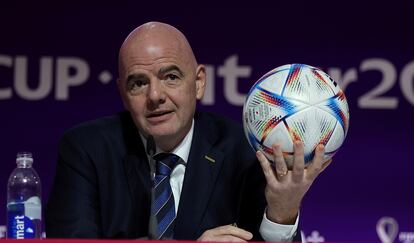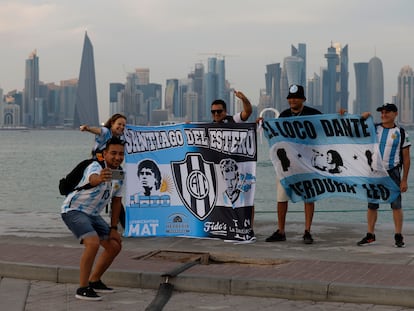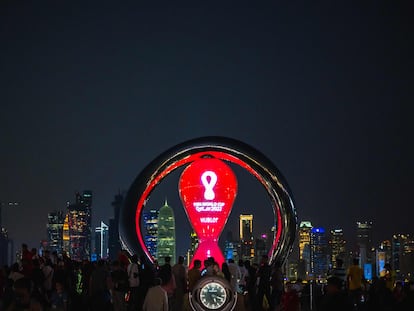FIFA president defends Qatar World Cup, slams Western ‘hypocrisy’
In response to complaints about the host nation’s human rights record, Gianni Infantino says that Europeans ‘should be apologizing for the next 3,000 years before giving moral lessons to people’
A few hours before the start of the 2022 World Cup, Gianni Infantino – the president of the Fédération Internationale de Football Association (FIFA) – gave a press conference in Doha, Qatar, the tournament’s host nation.
In response to questions regarding the human rights situation in the Gulf monarchy, Infantino – a 52-year-old Swiss-Italian – stated that Western countries are not in a position to criticize Qatar’s poor treatment of LGBT+ communities and migrant workers.
“What is sad is that, especially in the last weeks, we have been witnessing, in some places, a real lesson of double moral [standards],” Infantino said.
“I’m European. I think for what we Europeans have been doing for 3,000 years around the world, we should be apologizing for the next 3,000 years before giving moral lessons to people.”
Infantino, however, stopped short of defending the policies of the Qatari government, emphasizing that, under his leadership, FIFA required protections of migrant workers and LGBT+ visitors in exchange for awarding the football competition to the country.
“Everyone who comes to Qatar is welcome, whatever religion, race, sexual orientation, or belief she or he has. Everyone is welcome. This was our requirement and the Qatari state sticks to that requirement.”
Bryan Swanson – FIFA’s openly-gay director of communications – seconded this point: “I am sitting here as a gay man in Qatar. We have received assurances that everyone will be welcome and I believe everyone will be.”
In an emotional attempt to placate criticism, Infantino then referred back to his childhood to try and put across the point that fighting discrimination was important to him. He discussed how he was bullied in school for being a foreigner and a redhead.
“Today, I feel Qatari. Today, I feel Arab. Today, I feel African. Today, I feel gay. Today, I feel disabled. Today, I feel like a migrant worker.”
While these comments were widely panned, the 52-year-old football administrator followed up by trying to explain that, while he is, in fact, not any of those things, his life experiences have helped him understand what it is like to be treated as less than equal.

“My parents were Italian migrant workers in Switzerland. I remember how they treated us. The customs, the medical checks… when I came to Doha for the first time, after I was elected to the presidency of FIFA, I went to see where the migrant workers were living. And I told the Qatari people, ‘this isn’t good, we have to do something about this.’ And just like Switzerland has become a more tolerant and inclusive place, Qatar has also made progress.”
Infantino also launched into a forceful attack on Western corporations that have been doing business in Qatar without ever questioning the conditions of migrant workers, most of whom hail from Asia. He said that it was hypocritical that FIFA was being called out, while other, larger organizations were not criticized.
“How many of these European companies who earn millions and millions from Qatar or other countries in the region – billions every year – how many of them have addressed migrant-worker rights? I have the answer: none of them. Because, if they change the [labor] legislation, it means less profit.”
“But we did. And FIFA generates much, much, much less than any of these companies, from Qatar.”
He also complained that Western media outlets were not giving credit to the fact that, as part of the conditions imposed by FIFA, the kafala system – a form of semi-slavery often used to keep migrant workers tied to their employers in Gulf countries – had been reformed, while protections against excess heat exposure had also been implemented.
Infantino – whose wife is Lebanese – then turned his attention to the policies of European countries, in an attempt to demonstrate the hypocrisy surrounding human rights rhetoric that often emanates from his home continent: “Hundreds of thousands of migrant workers [in Qatar] come to help their families survive. [But] in Europe, we close our borders and we don’t allow practically any workers from these countries to work legally in our countries. We all know there are many illegal workers in European countries [who have] living conditions which are not really the best.”
“Of course, there are things that don’t work [in Qatar] and need to be addressed,” he clarified. “But this moral lesson-giving, it’s just hypocrisy.”
Infantino took advantage of the press conference to play up some FIFA-led initiatives, such as the establishment of a branch of the International Labor Organization that will be available for the duration of the tournament, to support any workers who file complaints about mistreatment or lack of pay. He assured reporters that Qatari law now protects migrant workers. However, when questioned again about Qatar’s harsh punishment of homosexuals, he deferred to anecdotes from other countries in bygone eras:
“Yes, these [anti-gay] laws exist. They exist in many countries in the world. This legislation existed in Switzerland when they organized the World Cup in 1954.”
Infantino said that, on the subject of homosexuality, there are both generational and cultural differences. “If I asked my father about [LGBT rights], he would probably have a different answer than me.” The FIFA president admitted that he himself went through an “evolution” regarding his views on homosexuality.
After pivoting away from more controversial subjects, Infantino was asked about the alcohol restrictions that will be in place over the course of the tournament. Qatar, a Muslim country, forbids the sale and consumption of alcohol in many places.
“If that’s the biggest problem we’re going to have at the World Cup, I can hit the beach,” Infantino joked, making light of the concerns of fans who want the right to drink during and in-between matches.
“There will be designated zones where 100,000 people can drink alcohol at the same time. I think that if you can’t drink a beer for a few hours here and there, you’ll survive. Especially because these kinds of restrictions also exist in France and Spain,” he added, referencing how the sale of alcohol is prohibited inside many stadiums to avoid violence caused by inebriated attendees.
Tu suscripción se está usando en otro dispositivo
¿Quieres añadir otro usuario a tu suscripción?
Si continúas leyendo en este dispositivo, no se podrá leer en el otro.
FlechaTu suscripción se está usando en otro dispositivo y solo puedes acceder a EL PAÍS desde un dispositivo a la vez.
Si quieres compartir tu cuenta, cambia tu suscripción a la modalidad Premium, así podrás añadir otro usuario. Cada uno accederá con su propia cuenta de email, lo que os permitirá personalizar vuestra experiencia en EL PAÍS.
¿Tienes una suscripción de empresa? Accede aquí para contratar más cuentas.
En el caso de no saber quién está usando tu cuenta, te recomendamos cambiar tu contraseña aquí.
Si decides continuar compartiendo tu cuenta, este mensaje se mostrará en tu dispositivo y en el de la otra persona que está usando tu cuenta de forma indefinida, afectando a tu experiencia de lectura. Puedes consultar aquí los términos y condiciones de la suscripción digital.
More information
Archived In
Últimas noticias
Chris Martin, Taylor Swift, Elijah Wood and other famous wedding ‘crashers’
‘How does it feel to be a failure?’: Elizabeth Berkley’s journey from ‘Showgirls’ ridicule to vindication
The story of the Málaga virus: The code that haunted Google’s cybersecurity center director for 30 years
The impact of Ecuador’s mega-prison: A polluted river, cleared forests and military checkpoints
Most viewed
- Christian Louboutin: ‘Young people don’t want to be like their parents. And if their parents wear sneakers, they’re going to look for something else’
- The low-cost creative revolution: How technology is making art accessible to everyone
- Liset Menéndez de la Prida, neuroscientist: ‘It’s not normal to constantly seek pleasure; it’s important to be bored, to be calm’
- All the effects of gentrification in one corner of Mexico’s Colonia Roma
- December Social Security and SSI payments: Dates, double checks and the 2026 COLA increase












































